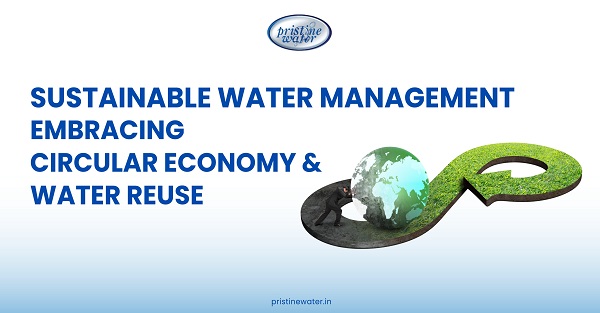
Sustainable Water Management in India: Embracing the Circular Economy and Water Reuse
In India and across the world, water scarcity and tightening environmental regulations have made sustainable water management a necessity. The solution lies in adopting circular economy principles, which promote wastewater reuse, zero liquid discharge (ZLD), and resource efficiency.
At Pristine Water, we are pioneers in electrochemical water treatment systems that support this shift—delivering advanced, eco-friendly, and cost-effective solutions.
What is Circular Water Management?
Circular water management treats water as a renewable resource within a closed-loop system—designed to reuse, recycle, and recover water while minimizing freshwater withdrawal and wastewater discharge.
This shift is essential for regions facing water stress, such as India, where groundwater depletion and freshwater scarcity are critical challenges. This model is gaining traction in:
- Manufacturing and heavy industries
- Smart cities and urban developments
- Thermal and nuclear power plants
- Municipal wastewater infrastructure
Why Circular Water Management is Crucial Today
-
Water Scarcity and Stress
Population growth, climate change, and industrialization are intensifying water stress globally. According to NITI Aayog, nearly 600 million Indians face high-to-extreme water stress. Circular systems allow stakeholders to do more with less, ensuring that every drop is used to its full potential. -
Environmental Impact
Untreated or partially treated wastewater released into rivers and lakes pollutes ecosystems and endangers human health. By closing the loop, circular water management helps reduce pollution, protect biodiversity, and support natural water cycles. -
Regulatory Compliance
Governments around the world are tightening wastewater discharge regulations. In India, the Central Pollution Control Board (CPCB) mandates Zero Liquid Discharge (ZLD) in many industrial sectors. Circular systems help organizations stay compliant while aligning with global sustainability frameworks like ISO 14001 and ESG mandates.
Role of Pristine Water in Circular Water Management
While circular water management requires an integrated approach—often involving multiple technologies and large-scale systems—Pristine Water’s electrochemical products serve as vital enablers in these ecosystems:
-
Electrochlorination Systems
Generate chlorine on-site from salt, enabling safe, continuous water disinfection in industrial and municipal reuse systems—without the need for hazardous chemical storage.
-
Chlorine Dioxide Generators
Used in water disinfection to eliminate pathogens and biofilm, enhancing the safety of water in reuse applications.
-
Containerized Water Treatment Systems
Decentralized plug-and-play units for treating wastewater in remote or space-constrained environments—perfect for industries or residential complexes that want to recycle water on-site.
Real-world Water Reuse Scenarios
-
Industrial Water Reuse
Industries are among the largest consumers of water. With circular strategies, facilities can:
- Capture and treat process water for reuse in cooling towers, boilers, and production lines.
- Implement ZLD systems to eliminate liquid discharge.
- Recover by-products like salts or nutrients from wastewater.
Many of these processes are supported by advanced treatment technologies such as electrocoagulation, membrane filtration, and electrochlorination.
-
Municipal and Community Reuse
Municipalities are adopting water reuse strategies such as:
- Treating sewage for non-potable uses like landscaping and industrial processes.
- Decentralized water recycling systems in residential complexes and commercial buildings.
- Stormwater harvesting and reuse for groundwater recharge or irrigation.
These initiatives reduce the burden on central treatment infrastructure and promote urban water resilience.
Benefits of Circular Water Management
-
Resource Efficiency
Reduces freshwater demand and operational costs. -
Environmental Sustainability
Lowers pollution and conserves natural water bodies. -
Regulatory Compliance
Meets environmental standards and effluent norms. -
Reputational Advantage
Demonstrates corporate responsibility and sustainability leadership.
Case Studies & Global Inspiration
Singapore’s NEWater Initiative
Singapore treats municipal wastewater through multiple filtration and disinfection stages, producing ultra-clean water used for both industry and drinking. NEWater now meets up to 40% of the country’s water demand.
Read more: NEWater in Singapore
India’s Industrial Parks
Several industrial clusters in India have deployed common effluent treatment plants (CETPs) with advanced reuse systems. These centralized plants support in-park water recycling and drastically reduce freshwater withdrawal.
As water challenges continue to intensify, circular water management offers a clear, practical, and future-ready path forward. By shifting from linear, wasteful practices to a model focused on reuse, recovery, and sustainability, both industries and municipalities can safeguard water resources, reduce environmental impact, and ensure long-term resilience.
Ready to Transform Your Water Strategy
Whether you’re an industrial facility aiming for zero liquid discharge, a municipality exploring decentralized reuse, or a developer building sustainable infrastructure—partnering with the technology provider is the key.
Contact Pristine Water to learn how our advanced water treatment and reuse solutions can help you implement circular water management tailored to your unique needs.
